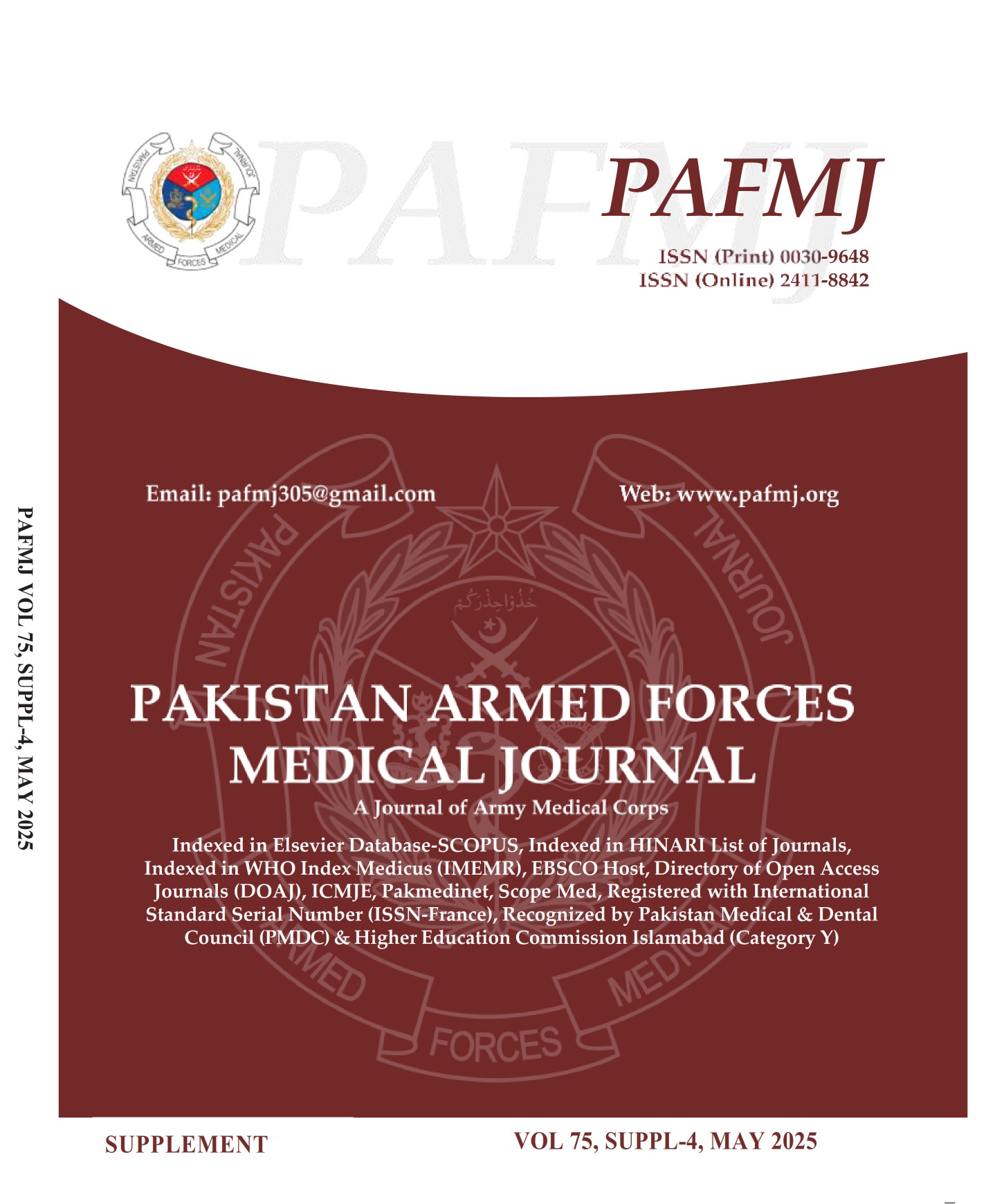Health Locus of Control and Perceived Levels of Depression, Anxiety, Stress Among Pakistani Female Breast Cancer Patient
DOI:
https://doi.org/10.51253/pafmj.v75iSUPPL-4.11988Keywords:
Health Locus of Control, Psychological distresses.Abstract
Objective: To explore how psychological strengths of Health Locus of control influence to psychological distresses (depression, anxiety, stress) in breast cancer female patients.
Study Design: Cross sectional study.
Place and Duration of Study: Oncology Department, Shifa International Hospital, Islamabad Pakistan, from Mar 2021 to Feb 2022.
Methodology: A non- probability sampling technique (purposive sampling) was used. A total sample of n = 115 breast cancer patients whose age range was from 28- 89 years. A biographical sheet that contains personal and disease information of patient, along with two indigenously adapted standardized scales were used: Multidimensional Health Locus of Control Form- C (Wallston, Stein, & Smith, 1994), and DASS-21 (Lovibond & Lovibond, 1995). To assess the construct under observation in current study.
Results: Findings suggested that Internal Health Locus of Control (IHLoC) and Doctors HLoC (DHLoC) are significantly and negatively correlated with DASS (Depression, Anxiety, and Stress) p<0.05, p<0.001 respectively. Conversely, the MHLoC subscale Chance (CHLoC) and Others HLoC are positively correlated with DASS with (p<0.05, p>0.05 respectively). The statistical regression analysis revealed Internal Health Locus of Control negatively influence to depression anxiety and stress (R²= 0.06, p<.05; F (1, 113) = 6.75, p<0.05), same on doctor HLoC, while all external dimension showed positive significant influences on outcome variable DASS (Depression, Anxiety, Stress).
Conclusion: Strength factor of internal health locus of control enables breast cancer patient to fight against psychological distresses. Psychologists, counselors/ therapists who are serving in oncology department, health care personnel’s recommendations are suggested.
Downloads
References
World Health Organization. Breast Cancer [Internet]. Geneva: World Health Organization; 2023 [cited 2024 Mar 31]. Available from:
https://www.who.int/news-room/fact-sheets/detail/breast-cancer?gad_source=1
Shan Y, Ji M, Xing Z, Dong Z, Xu X. Susceptibility to breast cancer misinformation among Chinese patients: cross-sectional study. JMIR Form Res 2023 [cited 2024 Mar 31];0. Available from: [PMC free article] [PubMed] [Google Scholar]
Jabeen Z, Shah N, Ahmer Z, Khan S, Khan AH, Khan M. Effect of health education on awareness and practices of breast self-examination among females attending a charitable hospital at North Karachi. J Pak Med Assoc 2021; 71: 2156–2162.
Pereira AA, Destro JR, Picinin Bernuci M, Garcia LF, Rodrigues Lucena TF. Effects of a WhatsApp-delivered education intervention to enhance breast cancer knowledge in women: mixed-methods study. JMIR Mhealth Uhealth 2020; 8: 0.
Mubarik S, Wang F, Luo L, Hezam K, Yu C. Evaluation of Lee-Carter model to breast cancer mortality prediction in China and Pakistan. Front Oncol 2023;13:1101249.
Shafique R, Rustam F, Choi GS, Díez IT, Mahmood A, Lipari V, et al. Breast Cancer Prediction Using Fine Needle Aspiration Features and Upsampling with Supervised Machine Learning. Cancers (Basel) 2023; 15(3): 681.
https://doi.org/10.3390/cancers15030681
Naz R, Kamal A, Mahmood A. Relationship of emotional intelligence and health locus of control among female breast cancer patients in Pakistan: emotional intelligence female breast cancer. Pakistan Armed Forces Medical Journal 2016; 66(6): 903–8. https://www.pafmj.org/PAFMJ/article/view/1281
Soqia J, Al-shafie M, Agha LY, Almieer MB, Alhomsi D, Saadoun R, et al. Depression, anxiety and related factors among Syrian breast cancer patients: a cross-sectional study. BMC Psychiatry 2022; 22: 796.https://doi.org/10.1186/s12888-022-04469-y
Brown AJ, Sun CC, Urbauer DL, Bodurka DC, Thaker PH, Ramondetta LM, et al. Feeling powerless: locus of control as a potential target for supportive care interventions to increase quality of life and decrease anxiety in ovarian cancer patients. Gynecol Oncol 2015; 138(2): 388-93. https://doi.org/10.1016/j.ygyno
Pahlevan Sharif S. Locus of control, quality of life, anxiety, and depression among Malaysian breast cancer patients: The mediating role of uncertainty. Eur J Oncol Nurs 2017; 27: 28-35.
https://doi.org/10.1016/j.ejon.2017.01.005
Lefcourt HM. Locus of control and the response to aversive events. Canadian Psychological Review/Psychologie Canadienne 1976; 17(3): 202–209. https://doi.org/10.1037/h0081839
Rotter JB. Internal - External Locus of Control Scale (I.E.). Assess locus of control dimension of personality: internal or external. 1966.
Wallston KA, Stein MJ, Smith CA. Form C of the MHLC Scales: A condition-specific measure of locus of control. Journal of Personality Assessment. 1994; 63(3): 534–53.
https://doi.org/10.1207/s15327752jpa6303_10
Lovibond PF, Lovibond SH. The structure of negative emotional states: comparison of the Depression Anxiety Stress Scales (DASS) with the Beck Depression and Anxiety Inventories. Behav Res Ther. 1995; 33(3): 335-43. https://doi.org/10.1016/0005-7967(94)00075-u
Aslam N, Kamal A, Translation, (2018). Validation and Effectiveness of Depression, Anxiety and Stress Scale (DASS-21) in Assessing the Psychological Distress among Flood Affected Individuals. Research Interest Score.
Kim HY. Statistical notes for clinical researchers: assessing normal distribution (2) using skewness and kurtosis. Restor Dent Endod 2013; 38(1): 52-4. https://doi.org/10.5395/rde.2013.38.1.52
Ali MM, Khokhar MA, Ahmed HN. Primary care physicians and cancer care in Pakistan: a short narrative. J Cancer Policy. 2020; 25: 100238.
Saeedi-Saedi H, Shahidsales S, Koochak-Pour M, Sabahi E, Moridi I. Title of the Article. Iran J Cancer Prev 2015; 8(1): 36–41.
Artherholt SB, Fann JR. Psychosocial care in cancer. Curr Psychiatry Rep 2012; 14(1): 23–29.
Park EM, Gelber S, Rosenberg SM, Seah DSE, Schapira L, Come SE et al. Anxiety and Depression in Young Women With Metastatic Breast Cancer: A Cross-Sectional Study. Psychosomatics 2018; 59(3): 251-258.https://doi.org/10.1016/j.psym.2018.01.007
Anagnosti F, Hardavella G, Lekka D, Darahani D, Anthouli-Anagnostopoulou F, Papagiorgis P et al. The Relationship of Health Locus of Control and Psychological Distress in Lung Cancer Patients during the COVID-19 Pandemic. Psychology 2023; 14(2). https://doi.org/10.4236/psych.2023.142012
Pourhoseinzadeh M, Gheibizadeh M, Moradikalboland M. The relationship between health locus of control and health behaviors in emergency medicine personnel. Int J Community Based Nurs Midwifery 2017; 5(4): 397–407.
Marta Kulpa, , Mariola Kosowicz, Beata J. Stypuła-Ciuba, Dorota Kazalska. Anxiety and depression, cognitive coping strategies, and health locus of control in patients with digestive system cancer . Prz Gastroenterol 2014; 9 (6): 329–335.
Downloads
Published
Issue
Section
License
Copyright (c) 2025 Rubina Naz, Saima Ambreen

This work is licensed under a Creative Commons Attribution-NonCommercial 4.0 International License.















